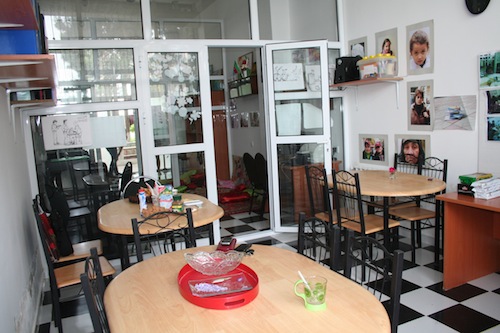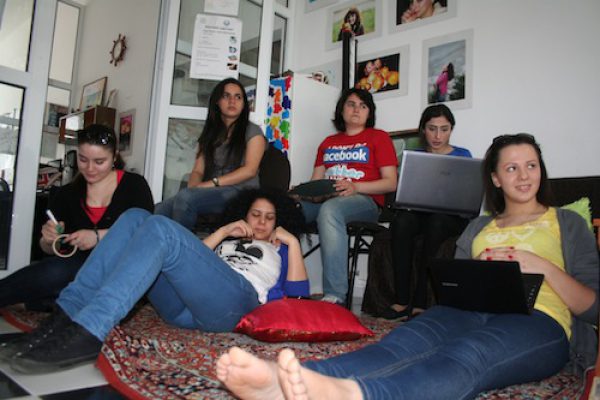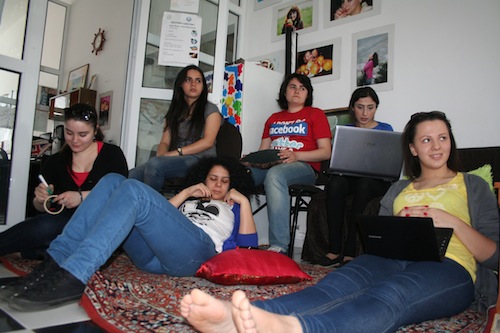During the summer and autumn of 2012 ca. 30 girls participated in the leisure time activities offered at the center as well as in computer, English and Russian courses. In December the first girl group came together and today there are six active girl groups. The groups are led by Girl Group leaders who were trained in the spring of 2012 and since then have been actively engaged in the center’s activities. The leaders had the chance to get to know the participants and are happy to have succeeded in creating girl groups which now meet regularly. During the project visit that has recently been completed by project manager Sarah Stephan and girl group expert Justina Donielaite, and especially during the latter’s workshop, the leaders had occasion to share and discuss their first experiences of leading girl groups.
Within the project a handbook on the Girl Group method has been published in a revised Azerbaijani language version. The handbook will hopefully not only be of support to the leaders but contribute to the dissemination of the method and gain the interest of other actors in Azerbaijan who are willing to become engaged in youth work with a gender perspective.
The project staff has taken on the challenge of working with a gender perspective and for increasing gender equality in a country where inequality and gender inequality remain big societal problems, problems which, however, are not being awarded much space in public debates. A baseline study concerning the participants’ attitudes and awareness about gender issues, which has been done within the project, shows that the majority of teenage girls experience that girls and boys are expected to fill different roles and that their lives are determined by different norms. Girls and women are limited in many ways by such norms and are expected first and foremost to engage at home and within the family, men remain the prime decision-makers on all level of society.
In addition to meeting the local project team in Azerbaijan and planning the activities for the coming months, the project visit was an occasion for Sarah and Justina to meet the Peace Institute’s former volunteers Kamala Ramazanova and Gunel Isakova, both of whom have made important contributions to the project and were now able to share their impressions from the politically tense situation in the country and its youths’ intensifying struggle for the freedom of speech.
Open Doors received financing from the Ministry for Foreign Affairs, Emmaus Åland and the Åland Islands Peace Institute up until the autumn of 2014. The girl center will continue offering a broad range of activities for girls in the neighborhood and the intention is to establish more girl groups. In September 2013 the leaders from Azerbaijan will have the possibility to participate in a method symposium on the Girl and Boy Group Method which will be arranged in Vilnius by the Peace Institute in cooperation with the Missing Persons’ Families’ Support Center.


 In the neighborhood of Ahmedli, a few blocks away from the last metro stop, far off the glittering lights of Baku’s city center, the women’s organization Yuva runs “Open Doors”, a youth center for teenage girls. The center is supported financially and conceptually by the Åland Islands Peace Institute and opened its doors for girls living in the adjacent apartment buildings almost exactly one year ago, in May 2012, and is today a popular meeting place for girls and young women.
In the neighborhood of Ahmedli, a few blocks away from the last metro stop, far off the glittering lights of Baku’s city center, the women’s organization Yuva runs “Open Doors”, a youth center for teenage girls. The center is supported financially and conceptually by the Åland Islands Peace Institute and opened its doors for girls living in the adjacent apartment buildings almost exactly one year ago, in May 2012, and is today a popular meeting place for girls and young women.
